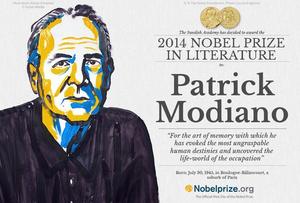 French novelist Patrick Modiano has won the Nobel Prize in Literature "for the art of memory with which he has evoked the most ungraspable human destinies and uncovered the life-world of the Occupation," the Swedish Academy said. The prize is worth 8 million kronor (about $1.1 million).
French novelist Patrick Modiano has won the Nobel Prize in Literature "for the art of memory with which he has evoked the most ungraspable human destinies and uncovered the life-world of the Occupation," the Swedish Academy said. The prize is worth 8 million kronor (about $1.1 million).
In its biography of the winner, who was born near Paris less than three months after the end of World War II in Europe, the Academy said that "Modiano's works centre on topics such as memory, oblivion, identity and guilt. The city of Paris is often present in the text and can almost be considered a creative participant in the works. Rather often his tales are built on an autobiographical foundation or on events that took place during the German Occupation. He sometimes draws material for his works from interviews, newspaper articles or [his] own notes, which he has accumulated over the years. His novels show an affinity with one another, and it happens that earlier episodes are extended or that persons recur in different tales."
The New York Times said that "many of his fictional works delve into the moral dilemmas that citizens faced during , and some play with the detective genre."
Most of Modiano's titles translated into English are out of print, although that may change soon. Those works include 1978 Prix Goncourt-winner Missing Person (Rue des Boutiques Obscures), translated by Daniel Weissbort and published by Verba Mundi/David R. Godine; Suspended Sentences: Three Novellas, translated by Mark Polizzotti, to be published by Yale University Press in February; Out of the Dark (Du Plus Loin de l'Oubli), translated by Jordan Stump and published by University of Nebraska Press; Honeymoon (Voyage de noces), published by Verba Mundi/David R. Godine; and Dora Bruder, translated by Joanna Kilmartin and published by University of California Press.
Modiano also has written children's books and film scripts, including the screenplay for Lacombe Lucien, the 1974 movie directed by Louis Malle and set during the Nazi Occupation of France.

